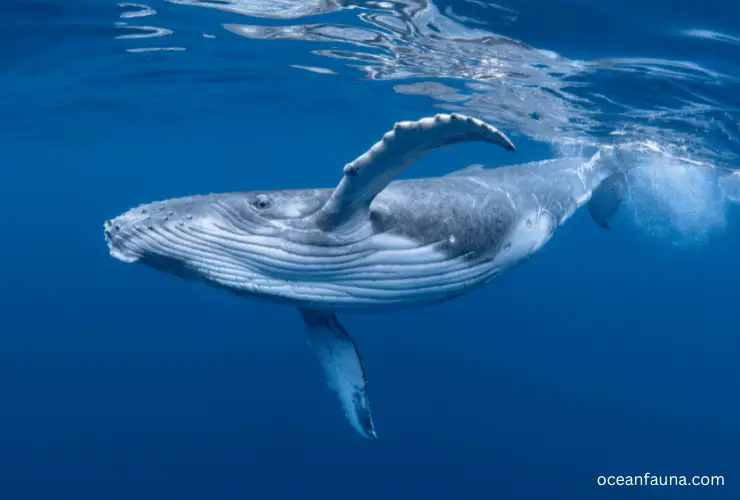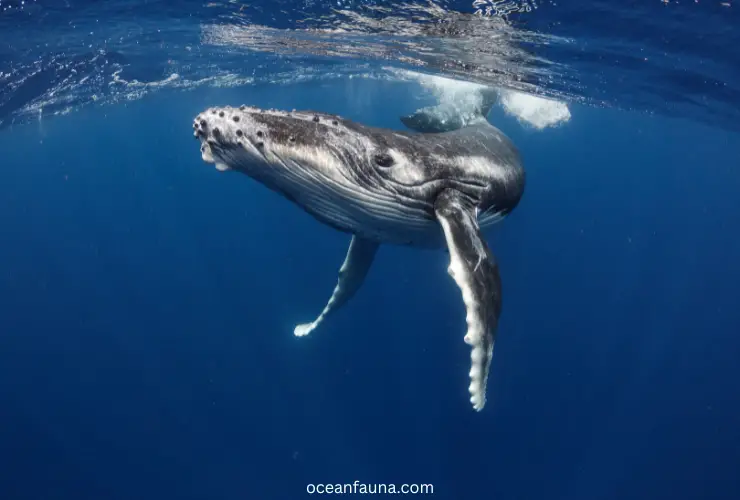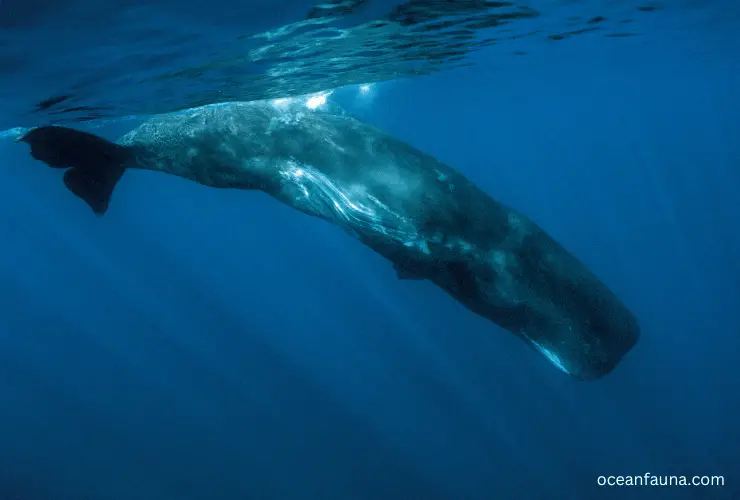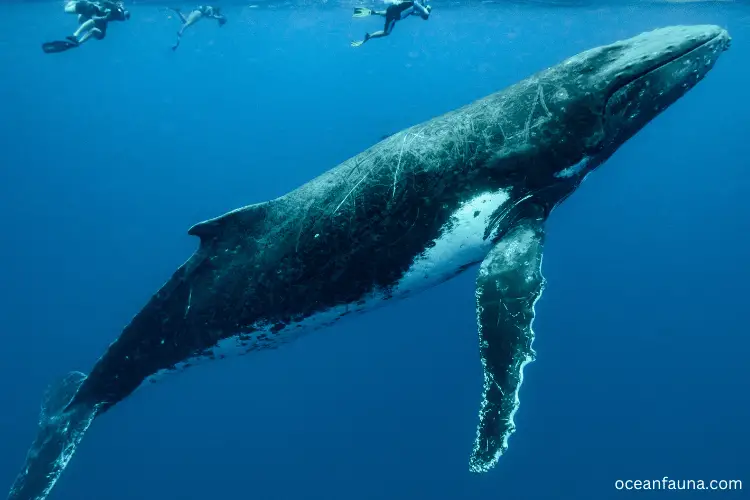What do you think? How long do whales live? 10, 20, or 100 years? It depends entirely on their species, environments, and health conditions. However, on average, most whales live for around 40-70 years, but some species of whales can live over 100 years.
However, in this blog, I will discuss how long different whales live, the longest-living whale species, and what affects their lifespan.
How Long Do Whales Live?

On average, most whales live for around 40-70 years. This lifespan is influenced by genetics, food supply, habitat quality, and risks from predators and diseases. A diet rich in krill and other prey helps whales live longer. It provides the nutrients they need for good health and long life.
Some whale species, like the bowhead whale, live over 100 years. A particular bowhead whale was found to be over 200 years old. This age makes it one of the oldest mammals on Earth. Their long lives are due to slow metabolism, low predation risk, and thick fat that insulates them in cold Arctic waters.
Despite some whales’ impressive lifespans, human activities threaten many. Take the North Atlantic Right Whale as an example. It lives for about 70 years but faces critical endangerment from fishing gear, ship strikes, and habitat loss due to warmer oceans.
Which Factors Influence the Lifespan of Whales?

Whales are known to have a remarkable lifespan, many living well beyond 50 years, and some even reaching the age of 100. However, their lifespan can be influenced by several factors, which are given as follows:
Species
The lifespan of whales can vary depending on their species. Some species, like the blue whale, can live around 80-90 years, while the bowhead whale is known for their exceptional lifespan, living well beyond 200 years.
However, check out the below table for a more detailed understanding of the average lifespan of different whales.
| Whale Species Name | Average Lifespan |
| Blue whale | 80-90 years |
| Humpback whale | 40-90 years |
| Fin whale | 60-100 years |
| Bowhead whale | 100-200 years |
| Sperm whale | 60-80 years |
| Beluga whale | 40-80 years |
| Minke whale | 30-50 years |
| Narwhal | 40-60 years |
| Gray whale | 50-70 years |
| Southern Right whale | 60-70 years |
| Bryde’s whale | 50-70 years |
| Rice whale | 50-60 years |
| Sei whale | 40-60 years |
| Omura’s whale | 40-45 years |
Health
The overall health of the whale plays a crucial role in their lifespan. Environmental changes and human activities can impact whales’ health. Habitat loss, climate change, ocean pollution, and overfishing can reduce their lifespan. Diseases and injuries also play a role.
Location
A whale’s location affects its lifespan. Areas with abundant food and high-quality habitats, like the Arctic Ocean, support better health and longer lives. These regions offer superior breeding, nursing, and feeding grounds with fewer predators.
Human Impact
Human activities have significantly influenced whale lifespans. Extensive cultural whale hunting led to ‘whale wars,’ significantly reducing some species’ lifespans. Today, industrial fishing and illegal commercial whaling deplete food sources and harm populations.
Additionally, ocean pollution, ship collisions, and warming oceans pose serious threats.
Environment
The environment directly affects a whale’s lifespan. Factors like climate change, natural disasters, and food availability are crucial. For example, seasonal food changes in the Arctic impact the health and lifespan of many whale species.
Which Whale Has the Longest Lifespan?

Bowhead whales, native to the Arctic and sub-Arctic, are known for having the longest lifespan among mammals. These creatures can live for over 200 years, making them key subjects for research and conservation.
Scientists link the bowhead whale’s longevity to its slow metabolism. They have a low body temperature and a slow metabolic rate, helping them conserve energy and maintain vital functions much longer than other mammals.
How old is the oldest whale? The oldest whale is a bowhead, estimated to be 268 years old. This remarkable age suggests some bowhead whales were alive during George Washington’s presidency. Such longevity makes them fascinating for scientists and conservationists.
Years of research support the bowhead whale’s title for the longest lifespan. Their unique genetic makeup protects their cells from DNA damage and prevents age-related issues, alongside their slow metabolism.
Which whale has the shortest lifespan?
No research proves which whale species lives for the shortest time. However, the dwarf sperm whale, inhabiting tropical and temperate waters, has a shorter lifespan than all whales, averaging 20-25 years. This fact underscores the unique challenges they face.
Researchers have found that hunting, pollution, and climate change are threats that shorten their lifespan. These whales are also prone to fatal boat collisions. Additionally, entanglement in fishing gear is a significant risk for these small whales.
Their small size also makes them vulnerable to predators like killer whales and sharks. Moreover, like other cetaceans, dwarf sperm whales are highly susceptible to various diseases, reducing their lifespan.
FAQs
Do whales live 1,000 years?
No, whales do not live for 1,000 years. The longest-lived whale is the bowhead whale, which has an average lifespan of 200 years, and the oldest recorded individual lived up to 268 years.
How long do whales live in captivity?
Whales kept in captivity typically live shorter lifespans than their wild counterparts. This is due to necessary environmental conditions and access to food resources, both of which can be limited in captivity. Generally speaking, whales kept in captivity tend to have a lifespan between 10-20 years, depending on their species.
Can whales live up to 100 years?
Yes, Bowhead whales have been recorded to live over 200 years. It makes them one of the few mammals living for over a century. However, human activities significantly affect their lifespans and threaten their survival in the wild.
How long do killer whales live?
Killer whales, orcas for short, are dolphins and can live for an impressive 50-90 years on average. But get this: female killer whales have been known to stick around for up to 100 years. Such a long lifespan makes them one of the longest-living members of the dolphin family.
Conclusion
Now, you have an overall idea of whales’ lifespan. Whales can live for centuries, with some species living as long as 268 years. At the same time, there are also whale species with a much shorter lifespan of around 20-25 years.
The lifespan of whales is determined by several factors, such as their species, health, location, human impact, and environment. To ensure the well-being of whales, it is important to protect their habitats and reduce the human impact on these majestic creatures. Only with concerted efforts can we have a chance to preserve these magnificent animals for generations to come.

